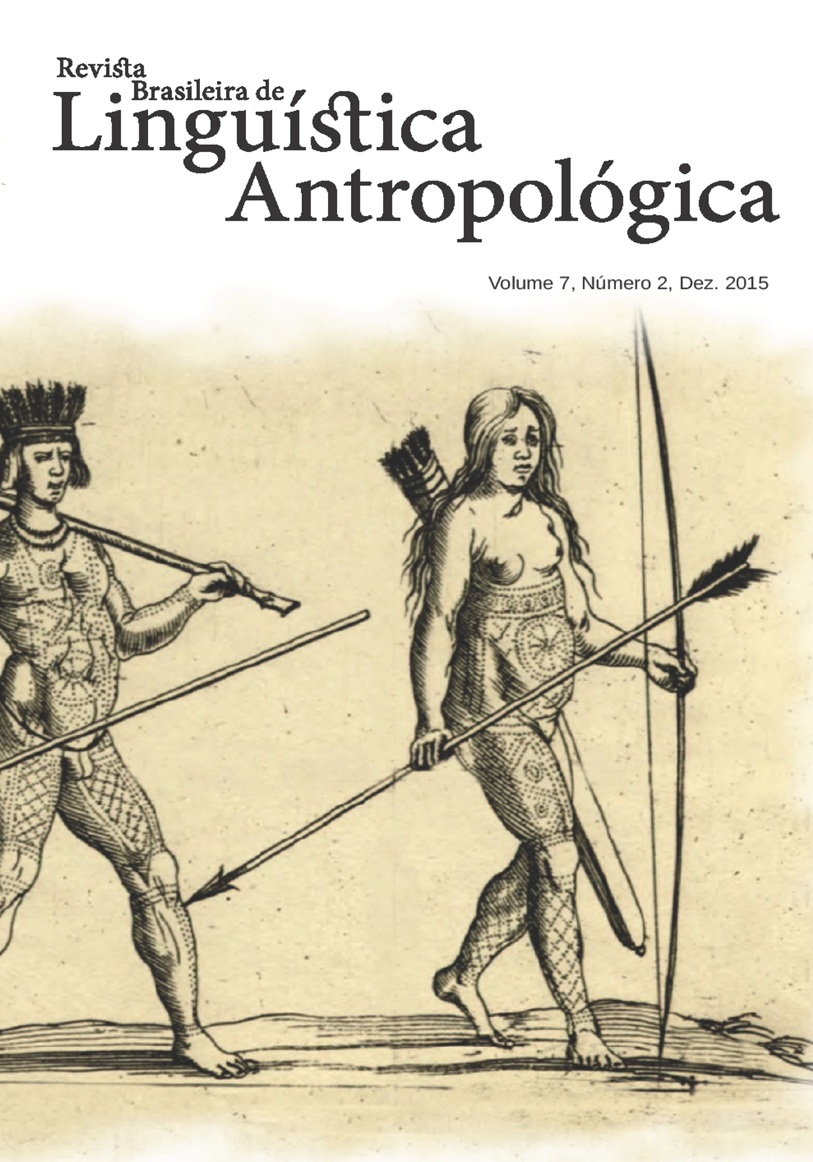La posesión externa en Mazahua
DOI:
https://doi.org/10.26512/rbla.v7i2.20598Keywords:
Mazahua. Dative. External possession. Direct object. Indirect object.Abstract
The constructions of external possession in mazahua are coded as dative suffix; these structures behave syntactically as indirect object. The features under which presents the construction of external possession are: the nominal phrase that expresses the relationship possessed-possessor bears a mark of possession and basically this sentence appear in postverbal position. The possessed entity is semantically very wide, i.e. relations part all, kinship relationships and possessions in general, such as food, clothing, money, animals, housing, labor, musical instruments and crops. The possessor is an animate entity and may appear in first, second and third person. The states of things expressed in constructions code activities, achievements, accomplishments that usually can or cannot affect the patient. External possession is not coded with locative complements and state verbs. The event should not be reflexive and the subject is not cross-referenced with possessed NP.
Downloads
References
Aikhenvald Alexandra Y. y R.M.W. Dixon 2013. Possession and ownership. A crossLinguistic Typology. Oxford: Oxford University Press.
Arellanes, Francisco; Alejandra Ortíz; Armando Mora y Antonio García 2014. “Syntax of the non-eventive semantic relations in four Otomanguean languages: Amuzgo, Mazahua, Mazatec and Zapotec”. 6th International Conference Syntax of the World’s Languages: Pavia (Italia).
Beavers, John 2011. “On Affectedness”. Natural Language & Linguistic Theory 29. 335-370.
Dowty, David 1991. “Thematic proto-roles and argument selection”. Language 67:547- 619.
Fidencio, Verónica 2012. “Alomorfía del objeto directo e indirecto en Mazahua de San Pedro del Rosal”. V Coloquio de Lenguas Otomangues y Vecinas. México: Fray Antonio de los Reyes. Oaxaca.
Fried, Mirjam 1999. “From Interest to Ownership A Constructional View of External Possessors”, en External possession. Payne, Doris L. y Immanuel Barshi (eds). Amsterdam: John Benjamins Publishing, pp 473-504.
Knapp, Michael 2008. Fonología segmental y léxica del mazahua. México: INAH.
Haspelmath, Martin 1999. “External Possession in a European Areal Perspective”, en External possession. Doris L. Payne y Immanuel Barshi (eds). Amsterdam: John Benjamins Publishing, pp 109-136.
Hopper, Paul J. and Sandra A. Thompson 1980. “Transitivity in grammar and discourse”. Language 56:251”“299.
Mithun, Marianne. 1984. “The evolution of Noun Incorporation”, en Languages 60: 847-894.
Mora-Bustos, Armando 2012. “Relaciones gramaticales en mazahua”. Seminario de complejidad sintáctica. México: Universidad de Sonora.
Mora-Bustos, Armando 2015. “Los verbos ditransitivos en mazahua”. Liames 15: 83-103.
Palancar Enrique y Roberto Zavala (eds) 2013. Clases léxicas, posesión y cláusulas complejas en lenguas de Mesoamérica. México: Publicaciones dela casa Chata.
Palancar Enrique 2008. “Posesión externa en otomí”. Estudios de cultura otopame. 6: 263-279.
Palancar Enrique 2009. Gramática y textos del hño_ñho_. Otomí de San Ildefonso.
Tultepec, Querétaro. México: Universidad de Querétaro y Plaza y Valdes.
Payne, Doris L. y Immanuel Barshi (eds) 1999. External possession. Amsterdam: John Benjamins Publishing.
Peralta Ramírez, Valentín 2013. “Posesión externa en el náhuatl de Amanalco”, En Clases léxicas, posesión y cláusulas complejas en lenguas de Mesoamérica. Palancar Enrique y Roberto Zavala (eds). México: Publicaciones dela casa Chata. pp. 103-131.
Quintana Toribio, Elizabeth 2012. Marcación de la posesión en la lengua mazahua de San Juan de las Manzanas, Edo. Mex. (2010-2012). México: Universidad Intercultural del Estado de México. Tesis de licenciatura.
Stewart, Donald 1966. Gramática del mazahua. Correcciones y comentarios de Doris Bartholomew. ILV: México. (Manuscrito).
Vargas Bernal, Gloria 2013. Alineamiento e intransitividad escindida en mazahua. México. CIESAS. Tesis de maestría.
Downloads
Published
How to Cite
Issue
Section
License
Copyright (c) 2016 Revista Brasileira de Linguística Antropológica

This work is licensed under a Creative Commons Attribution 4.0 International License.
Authors who publish in RBLA agree to the following terms:
a) Authors maintain the copyright and grant the journal the right of first publication, and the work is simultaneously licensed under the Creative Commons Attribution License, which allows the sharing of the work with recognition of the authorship of the work and initial publication in this journal.
b) Authors are authorized to assume additional contracts separately, for non-exclusive distribution of the version of the work published in this journal (eg, publish in an institutional repository or as a book chapter), with recognition of authorship and initial publication in this journal.
c) Authors are allowed and encouraged to publish their work online (eg, in institutional repositories or on their personal page) at any point before or during the editorial process, as this can generate productive changes, as well as increase impact and citation of the published work.







